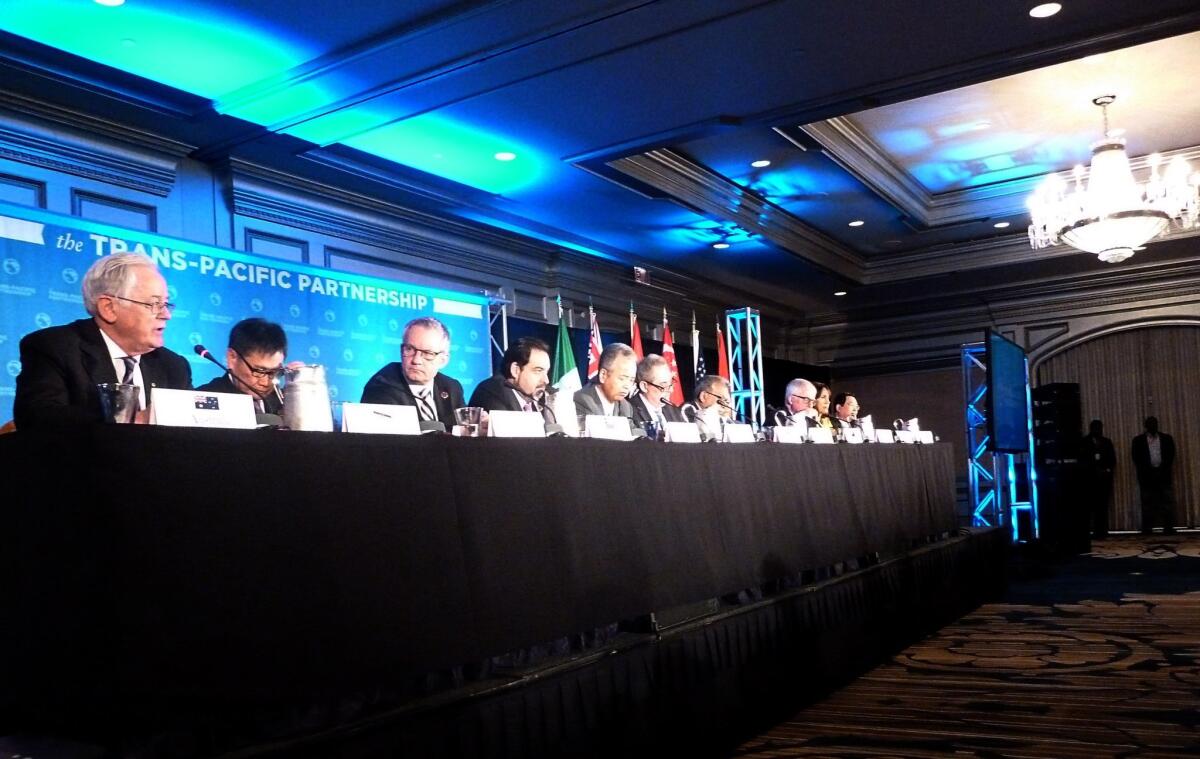Fight over Pacific trade agreement begins

Delegates attending the Trans-Pacific Partnership talks hold a press conference Oct. 5 in Atlanta. Twelve Pacific rim countries sealed the deal then to create the world’s largest free trade area.
Reporting from Washington — The long-anticipated release Thursday of the sweeping Pacific Rim trade agreement text set off an intense public battle over its pros and cons that probably will rage until Congress issues its own verdict next year.
Critics of the Trans-Pacific Partnership insisted the accord’s environmental and dispute settlement sections were worse than they had expected. Republican lawmakers and some business and pro-trade groups reacted more positively as they pored over the text’s 2,700 pages.
The pact lists thousands of tariff items that will be reduced or eliminated, including rice, dairy and sugar. It also sets uniform rules and practices for intellectual property, labor rights, government procurement and other aspects of international commerce for the 12 countries that have pledged to adopt it.
The agreement was completed last month in Atlanta after more than five years of complex negotiations involving the United States, Japan, Canada, Australia, Mexico, Malaysia, Singapore, Chile, Peru, New Zealand, Vietnam and Brunei.
If implemented, it would be the largest regional trade agreement in the world, encompassing countries that constitute 40% of the global economy, and a key part of President Obama’s legacy.
The pact could have a major effect on California, home to the nation’s busiest ports and a major exporter of electronics, farm products, machinery and other goods and services to Pacific Rim countries.
The text shows that California farmers, for example, will most likely be able to export about 50,000 additional metric tons of rice annually to Japan’s lucrative market, about 15% more than average shipments in recent years.
The state’s tech sector and entertainment industry, meanwhile, are expected to benefit from an easing of cross-border data flows and long copyright protections for film and music.
Obama has pushed the deal as good for America’s economy, as well as important to U.S. interests in a region where U.S. influence is being challenged by China’s growing economic and military clout. China is not party to the trade deal.
But the president faces stiff opposition from many Democrats in Congress and traditional allies, including environmental groups and organized labor. They have criticized the lack of transparency in the negotiations, as well as the pact itself.
Obama’s bid also is complicated by 2016 presidential campaign politics.
Leading candidates from both parties, including Hillary Rodham Clinton and Donald Trump, oppose the deal for different reasons. Free trade isn’t likely to garner populist support in a presidential race.
The White House won so-called fast-track trade authority in Congress last summer, so members can vote the deal up or down, but not amend it.
That vote isn’t expected before February, when the first presidential primaries and caucuses will be underway.
Senate and House committee leaders are expected to hold hearings in coming weeks, while labor, environmental, business and other groups ratchet up their efforts to win public and congressional support.
“Long way to go,” said William Reinsch, president of the National Foreign Trade Council, a pro-trade group representing 200 mostly large multinational companies.
Reinsch said some business associations may be hesitant to speak out because their member companies are split on the accord.
“At this point, we have to see what our members say,” Reinsch said.
AFL-CIO officials were not shy about their position.
Although the newly released text of the labor chapter largely matched earlier drafts leaked or seen by labor leaders, it also revealed a separate side deal between the U.S. and Vietnam.
The Communist-led country’s participation in the trade deal has been a hot issue for U.S. labor because of its cheap labor and weak protection of worker rights.
As a low-cost alternative to China in manufacturing, Vietnam’s developing economy is likely to be one of the biggest beneficiaries of the larger accord. It is expected to gain a bigger foothold in exports of textiles and foods.
Under the side deal, Vietnam would be required to allow workers to engage in collective bargaining. But American labor leaders said Vietnam could restrict certain labor assembly rights for five years, the length of time before the U.S. could essentially penalize Vietnam on trade if it does not comply.
“We’re disappointed that President Obama didn’t do more, particularly with enforcement measures,” said Thea Lee, deputy chief of staff at the AFL-CIO.
Obama, in a statement, said the accord “includes the strongest labor standards in history, from requiring a minimum wage and worker safety regulations to prohibiting child labor and forced labor.”
He also praised the environmental commitments in the pact, saying they required “countries in one of the most biologically diverse areas on Earth to crack down on illegal wildlife trafficking, illegal logging and illegal fishing.”
The Natural Resources Defense Council, a leading environmental group that has supported previous trade deals, said the text revealed “some fundamental problems,” however.
“While there are some positive conservation measures, the agreement’s substantial shortcomings should lead Congress to reject it,” said Jake Schmidt, a senior NRDC official.
One of the pact’s most controversial provisions allows multinational investors to sue foreign governments for unfair or unequal treatment. They would be able to bring cases before a special arbitration tribunal that is unavailable to domestic investors.
Critics fear large companies will exploit the arbitration mechanism to demand compensation from the U.S. and other nations for laws and policies meant for the public good.
The accord would exempt tobacco companies from using the provision to sue foreign governments for anti-smoking laws. But lawmakers in tobacco states opposed that exemption, and it could affect GOP leaders’ review of the deal.
Another controversial area was intellectual property protections for certain drugs.
U.S. pharmaceutical companies fell short of getting 12 years of data protection for so-called biologic medicines. But they won provisions that will require some countries, including Peru and Vietnam, to begin enforcing rules for the first time that guarantee at least five to eight years of market exclusivity.
Doctors Without Borders and other humanitarian groups had said the provision will severely restrict access to generic medicines, including cancer therapies, especially in the developing world. The Obama administration argued that it struck a balance between patient needs and the costs for research and development to bring important drugs to market.
More to Read
Inside the business of entertainment
The Wide Shot brings you news, analysis and insights on everything from streaming wars to production — and what it all means for the future.
You may occasionally receive promotional content from the Los Angeles Times.











